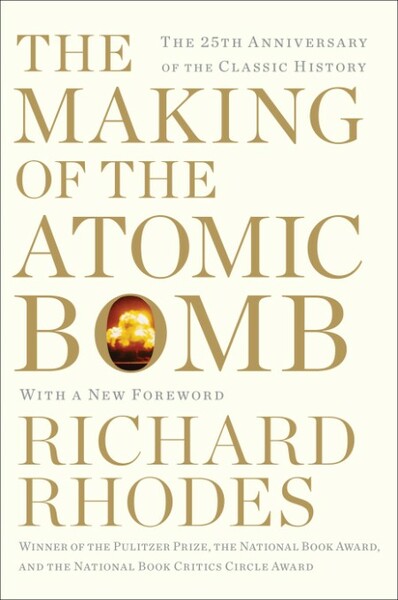Most Commented
The Making of the Atomic Bomb by Richard Rhodes




Description material

epub | 39.13 MB | English | Isbn: B008TRU7SQ | Author: Richard Rhodes | Year: 2012
Description:
Twenty-five years after its initial publication, The Making of the Atomic Bomb remains the definitive history of nuclear weapons and the Manhattan Project. From the turn-of-the-century discovery of nuclear energy to the dropping of the first bombs on Japan, Richard Rhodes's Pulitzer Prize-winning book details the science, the people, and the socio-political realities that led to the development of the atomic bomb.
This sweeping account begins in the 19th century, with the discovery of nuclear fission, and continues to World War Two and the Americans' race to beat Hitler's Nazis. That competition launched the Manhattan Project and the nearly overnight construction of a vast military-industrial complex that culminated in the fateful dropping of the first bombs on Hiroshima and Nagasaki.
Reading like a character-driven suspense novel, the book introduces the players in this saga of physics, politics, and human psychology—from FDR and Einstein to the visionary scientists who pioneered quantum theory and the application of thermonuclear fission, including Planck, Szilard, Bohr, Oppenheimer, Fermi, Teller, Meitner, von Neumann, and Lawrence.
From nuclear power's earliest foreshadowing in the work of H.G. Wells to the bright glare of Trinity at Alamogordo and the arms race of the Cold War, this dread invention forever changed the course of human history, and The Making of The Atomic Bomb provides a panoramic backdrop for that story.
Richard Rhodes's ability to craft compelling biographical portraits is matched only by his rigorous scholarship. Told in rich human, political, and scientific detail that any reader can follow, The Making of the Atomic Bomb is a thought-provoking and masterful work.
**
Amazon.com Review
If the first 270 pages of this book had been published separately, they would have made up a lively, insightful, beautifully written history of theoretical physics and the men and women who plumbed the mysteries of the atom. Along with the following 600 pages, they become a sweeping epic, filled with terror and pity, of the ultimate scientific quest: the development of the ultimate weapon. Rhodes is a peerless explainer of difficult concepts; he is even better at chronicling the personalities who made the discoveries that led to the Bomb. Niels Bohr dominates the first half of the book as J. Robert Oppenheimer does the second; both men were gifted philosophers of science as well as brilliant physicists. The central irony of this book, which won a National Book Critics Circle Award, is that the greatest minds of the century contributed to the greatest destructive force in history.
From Publishers Weekly
The breadth and scope of this gripping narrative is almost as impressive as the story itself. Rhodes ( Looking for America describes the theoretical origins of the bomb, the lab experiments, the building of the prototype, the test at Alamagordo, the training of the B-29 crews assigned to deliver the first two combat bombs and the missions themselves. There's much more. Rhodes, gifted with sharp psychological insight and a novelist's ability to convey character, reveals the personalities and emotional dynamics among Niels Bohr, Leo Szilard, Enrico Fermi, Edward Teller, Ernest Lawrence, Robert Oppenheimer, General Leslie Groves, Colonel Paul Tibbets and others responsible for conceiving, engineering, testing and ultimately dropping the apocalyptic devices on Hiroshima and Nagasaki. In addition he describes the struggle in Nazi Germany and Imperial Japan to make the first bomb, as well as the political and military events that led inexorably to the destruction of the Japanese cities. This is the most comprehensive and authoritative book on the subject to date. Illustrations. BOMC alternate.
Copyright 1987 Reed Business Information, Inc.
This sweeping account begins in the 19th century, with the discovery of nuclear fission, and continues to World War Two and the Americans' race to beat Hitler's Nazis. That competition launched the Manhattan Project and the nearly overnight construction of a vast military-industrial complex that culminated in the fateful dropping of the first bombs on Hiroshima and Nagasaki.
Reading like a character-driven suspense novel, the book introduces the players in this saga of physics, politics, and human psychology—from FDR and Einstein to the visionary scientists who pioneered quantum theory and the application of thermonuclear fission, including Planck, Szilard, Bohr, Oppenheimer, Fermi, Teller, Meitner, von Neumann, and Lawrence.
From nuclear power's earliest foreshadowing in the work of H.G. Wells to the bright glare of Trinity at Alamogordo and the arms race of the Cold War, this dread invention forever changed the course of human history, and The Making of The Atomic Bomb provides a panoramic backdrop for that story.
Richard Rhodes's ability to craft compelling biographical portraits is matched only by his rigorous scholarship. Told in rich human, political, and scientific detail that any reader can follow, The Making of the Atomic Bomb is a thought-provoking and masterful work.
**
Amazon.com Review
If the first 270 pages of this book had been published separately, they would have made up a lively, insightful, beautifully written history of theoretical physics and the men and women who plumbed the mysteries of the atom. Along with the following 600 pages, they become a sweeping epic, filled with terror and pity, of the ultimate scientific quest: the development of the ultimate weapon. Rhodes is a peerless explainer of difficult concepts; he is even better at chronicling the personalities who made the discoveries that led to the Bomb. Niels Bohr dominates the first half of the book as J. Robert Oppenheimer does the second; both men were gifted philosophers of science as well as brilliant physicists. The central irony of this book, which won a National Book Critics Circle Award, is that the greatest minds of the century contributed to the greatest destructive force in history.
From Publishers Weekly
The breadth and scope of this gripping narrative is almost as impressive as the story itself. Rhodes ( Looking for America describes the theoretical origins of the bomb, the lab experiments, the building of the prototype, the test at Alamagordo, the training of the B-29 crews assigned to deliver the first two combat bombs and the missions themselves. There's much more. Rhodes, gifted with sharp psychological insight and a novelist's ability to convey character, reveals the personalities and emotional dynamics among Niels Bohr, Leo Szilard, Enrico Fermi, Edward Teller, Ernest Lawrence, Robert Oppenheimer, General Leslie Groves, Colonel Paul Tibbets and others responsible for conceiving, engineering, testing and ultimately dropping the apocalyptic devices on Hiroshima and Nagasaki. In addition he describes the struggle in Nazi Germany and Imperial Japan to make the first bomb, as well as the political and military events that led inexorably to the destruction of the Japanese cities. This is the most comprehensive and authoritative book on the subject to date. Illustrations. BOMC alternate.
Copyright 1987 Reed Business Information, Inc.
Category:Nuclear Weapons & Warfare History, Nuclear Weapons & Warfare History, Nuclear Physics
Join to our telegram Group
Information
Users of Guests are not allowed to comment this publication.
Users of Guests are not allowed to comment this publication.
Choose Site Language
Recommended news
Commented


![eM Client Pro 9.2.1735 Multilingual [Updated]](https://pikky.net/medium/wXgc.png)






![Movavi Video Editor 24.0.2.0 Multilingual [ Updated]](https://pikky.net/medium/qhrc.png)

